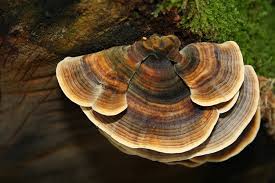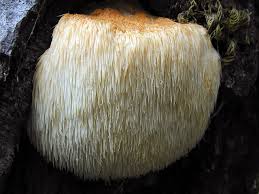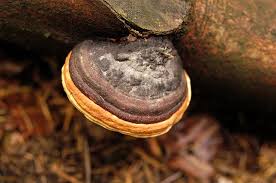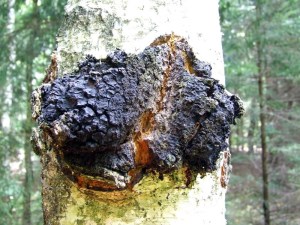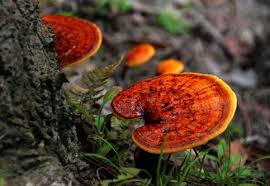Coriolus versicolor: Cancer Miracle Mushroom
The scientific evidence for this mushroom is powerful. If you have cancer, really of any type, you want to take Coriolus versicolor (Turkey Tail Mushroom. (It is also called Trametes versicolor, but in most of the research and manufacturing it is referred to as Coriolus versicolor.) There is too much research on this medicinal mushroom to cover it thoroughly in this update, so I will focus on some of the most recent, as well as the most compelling. The benefits are well proven: improves quality of life by reducing pain, decreasing cachexia, decreasing nausea and vomiting, along with improving effectiveness of chemo and radiation.1 One of the mechanisms for this is it’s effectiveness at increasing tumor necrosis factor-α (TNF-α). And it does this without inducing fever, but instead with a drop in body temperature.1
Another study from this year reports decreased metastasis of breast cancer with an extract of Coriolus. It was shown to stimulate the immune system and slow tumor growth. It decreased tumor weight by 36% and decrease lung metastasis by 70%. It also showed a protective effect on bone, which can be damaged and lost due to breast cancers. 2
Esophageal cancer cells are also reduced by a Coriolus versicolor extract. Scientists proved in a 2012 study that a human esophageal cancer cell line (Eca109) was kept from proliferating by the extract of Coriolus versicolor.3
One of the most amazing research articles on Coriolus versicolor is actually not a single study but a meta-analysis of many research studies over many years. What this study did was sift through years and years of research and only pull out the ones that were worthy of being included. Factors for this inclusion included that it be a human study, double-blinded and placebo-controlled; basically all of the things that we consider to constitute good science. The conclusion of their analysis was that Coriolus versicolor is very effective and safe at treating cancers (including colon, breast, and lung) and not only does it not interfere with conventional treatments like chemo and radiation, it actually helps those therapies work better.4
Hericium erinaceus for MS and Mental Decline
Another of my favorite medicinal mushrooms is Hericium (Lion’s Mane). Therapeutic uses include Parkinson’s disease, multiple sclerosis, post-stroke and dementia as well as anxiety and depression.6
One recent research study reviews many articles on how different medicinal mushrooms work for brain health pointed out that “The mushrooms (either extracts from basidiocarps/mycelia or isolated compounds) reduced beta amyloid-induced neurotoxicity and had anti-acetylcholinesterase, neurite outgrowth stimulation, nerve growth factor (NGF) synthesis, neuroprotective, antioxidant, and anti-(neuro)inflammatory effects.”5
One reason that it has shown benefit in Parkinson’s and Multiple sclerosis is that it has a protective effect on the myelin sheath – the outer coating of the axon of the nerve cell. The myelin sheath protects, coats and feeds the nerve cell, and damage to this creates some of the symptoms of neuro-degenerative diseases. A piece of research from 2003 showed that the extract of Hericium helped improve the health of these cells, and no toxic or damaging effect was found.6 This study was in vitro, and certainly more human studies are warranted.
Piwep from Phellinus igniarius and Multiple Sclerosis
This year some very exciting research showed than a medicinal mushroom extract called Piwep, which comes from Phellinus igniarius, can slow the damage to nerve cells caused by multiple sclerosis, in a mechanism believed to be related to it’s effect on the immune system. In an animal model, the mushroom extract showed suppression of demyelination in the disease that had been induced. It also inhibited migration of lymphocytes and interferon-γ to the site, decreasing inflammatory response. The extract was made using the fruiting bodies of the mushroom, using a process of hot water and ethanol extraction. Thus the name Piwep (Phellinus igniarius water-ethanol precipitate).7 More human research is certainly needed for this disease for which there is no known cause or effective current treatment.
Chaga Mushroom (Inonotus obliquus) Shows Promise in Herpes and Cancer
Several new studies this year show that Chaga mushroom has benefit in Herpes Simplex (HSV). No viral cells were detected in the group treated with the Chaga mushroom extract.12 In another study the extract of Chaga proved to inhibit viral membrane fusion, providing a new treatment option to usual nucleoside analog anti-herpetics.13
Anti-cancer benefits of the fruiting bodies of Inonotus were also shown in a research article from this year. This mushroom, commonly used in Russia, Poland and other Baltic areas, has extensive traditional use for various ailments such as stomach issues, cleansing and disinfecting, and cancer. The research shows the extract effective in decreasing tumor cell proliferation. The authors also note the very low toxicity to normal cells when the mushroom extract was applied.14
Amazing, Health Promoting Reishi Mushroom – Ganoderma lucidum
If nothing is wrong with you, is there a mushroom that you should take every day? Absolutely! Reishi is one mushroom with a tremendous amount of research behind it, for a plethora of issues. Reishi, like most mushrooms, is an excellent immune system booster. It is also very good at fighting a variety of cancers. Reishi is known as the mushroom of longevity, taken for centuries by Chinese royalty because of its powers of extending life.
Beyond treating cancer, this mushroom is effective for hypertension, hypercholesterolemia, and hepatitis – all while being amazingly safe. It has also been found to work well at treating skin wounds. 8
One of the major reasons that breast cancer remains so dangerous and has such a high mortality rate is its ability to metastasize quickly to nearby tissues, including lymph nodes and lungs. Recent research shows that Ganoderma lucidum helps to prevent metastasis to the lungs. In this study, the tumor size was decreased slightly, but the metastasis to the lungs was strongly inhibited. The mechanism for this inhibition is thought to be inhibition of pro-invasive genes.9
Other reported benefits from Ganoderma lucidum include: inhibiting histamine release, inducing apoptosis, inhibiting viral infections, antioxidant, CNS sedation, anti-microbial and immune modulation.
Best Form for Medicinal Effects
There is a good deal of controversy about what form is best for medicinal mushrooms. The greatest body of evidence points towards using hot water extractions. All mushrooms have a cell wall made of chitin. Our bodies cannot break this down to extract the potent medicine inside. So eating mushrooms, while a good source of fiber and other nutrients, will not provide you much medicinal benefit. The vast majority of the research on Coriolus showing it’s powerful anti-cancer benefit has been done on a hot water extract of the mushroom. There are companies who make a hot water extract that is then dehydrated and encapsulated, making it very simple to get very high doses of the mushroom desired. The only downside of this, particularly in mushrooms that need to be taken several times/day at high doses for maximum benefit, is the cost. But compared to most conventional cancer and MS therapies, it is still a fraction of what prescription medications cost.
There are scientists and purveyors of mycelium extracts who argue that mycelium is much more sustainable and just as efficacious. There are some good studies going on currently, but as of yet there is limited research the medical literature to confirm this. One recent study on Hericium did utilize mycelium extract and showed benefit.10
Another study on Chaga showed greater anti-oxidant activity with the fruiting bodies compared to the mycelium.11
References:
1 Jedrzejewski T1, Piotrowski J2, Wrotek S3, Kozak W4. Polysaccharide peptide induces a tumor necrosis factor-α-dependent drop of body temperature in rats. J Therm Biol. 2014 Aug;44:1-4. doi: 10.1016/j.jtherbio.2014.06.003. Epub 2014 Jun 12.
2 Luo KW1et al. In vivo and in vitro anti-tumor and anti-metastasis effects of Coriolus versicolor aqueous extract on mouse mammary 4T1 carcinoma. Phytomedicine. 2014 Jul-Aug;21(8-9):1078-87. doi: 10.1016/j.phymed.2014.04.020. Epub 2014 May 22.
3 Wang DF1, Lou N, Li XD. Effect of coriolus versicolor polysaccharide-B on the biological characteristics of human esophageal carcinoma cell line eca109. Cancer Biol Med. 2012 Sep;9(3):164-7. doi: 10.7497/j.issn.2095-3941.2012.03.002.
4 Eliza WL1, Fai CK, Chung LP. Efficacy of Yun Zhi (Coriolus versicolor) on survival in cancer patients: systematic review and meta-analysis. Recent Pat Inflamm Allergy Drug Discov. 2012 Jan;6(1):78-87.
5 Phan CW1, David P, Naidu M, Wong KH, Sabaratnam V. Therapeutic potential of culinary-medicinal mushrooms for the management of neurodegenerative diseases: diversity, metabolite, and mechanism. Crit Rev Biotechnol. 2014 Mar 24. [Epub ahead of print]
6 Kolotushkina EV1, Moldavan MG, Voronin KY, Skibo GG. The influence of Hericium erinaceus extract on myelination process in vitro. Fiziol Zh. 2003;49(1):38-45.
7 Li L1, et al. A mushroom extract Piwep from Phellinus igniarius ameliorates experimental autoimmune encephalomyelitis by inhibiting immune cell infiltration in the spinal cord. Biomed Res Int. 2014;2014:218274. doi: 10.1155/2014/218274. Epub 2014 Jan 27.
8 Gupta A1, et al. Wound Healing Activity of an Aqueous Extract of the Lingzhi or Reishi Medicinal Mushroom Ganoderma lucidum (Higher Basidiomycetes). Int J Med Mushrooms. 2014;16(4):345-54.
9 Loganathan J1 et al. The mushroom Ganoderma lucidum suppresses breast-to-lung cancer metastasis through the inhibition of pro-invasive genes. Int J Oncol. 2014 Jun;44(6):2009-15. doi: 10.3892/ijo.2014.2375. Epub 2014 Apr 9.
10 Lee KF1, Protective effects of Hericium erinaceus mycelium and its isolated erinacine A against ischemia-injury-induced neuronal cell death via the inhibition of iNOS/p38 MAPK and nitrotyrosine. Int J Mol Sci. 2014 Aug 27;15(9):15073-89. doi: 10.3390/ijms150915073.
11 Lin SY1, Preparation of Chaga medicinal mushroom, Inonotus obliquus-fermented rice using solid-state fermentation and its taste quality and antioxidant property. Int J Med Mushrooms. 2012;14(6):581-92.
12 Polkovnikova MV, et al. [A study of the antiherpetic activity of the chaga mushroom (Inonotus obliquus) extracts in the Vero cells infected with the herpes simplex virus].Vopr Virusol. 2014 Mar-Apr;59(2):45-8.
13 Pan HH1 et al. Aqueous extract from a Chaga medicinal mushroom, Inonotus obliquus (higher Basidiomycetes), prevents herpes simplex virus entry through inhibition of viral-induced membrane fusion. Int J Med Mushrooms. 2013;15(1):29-38.
14 Lemieszek MK1 et al. Anticancer effects of fraction isolated from fruiting bodies of Chaga medicinal mushroom, Inonotus obliquus (Pers.:Fr.) Pilát (Aphyllophoromycetideae): in vitro studies. Int J Med Mushrooms. 2011;13(2):131-43.

